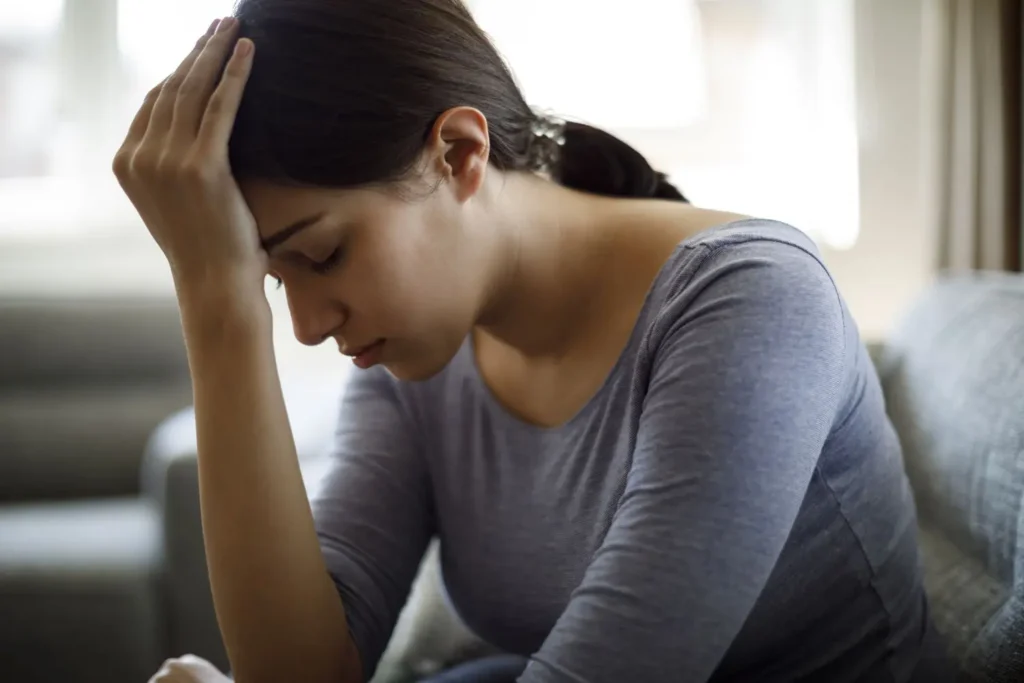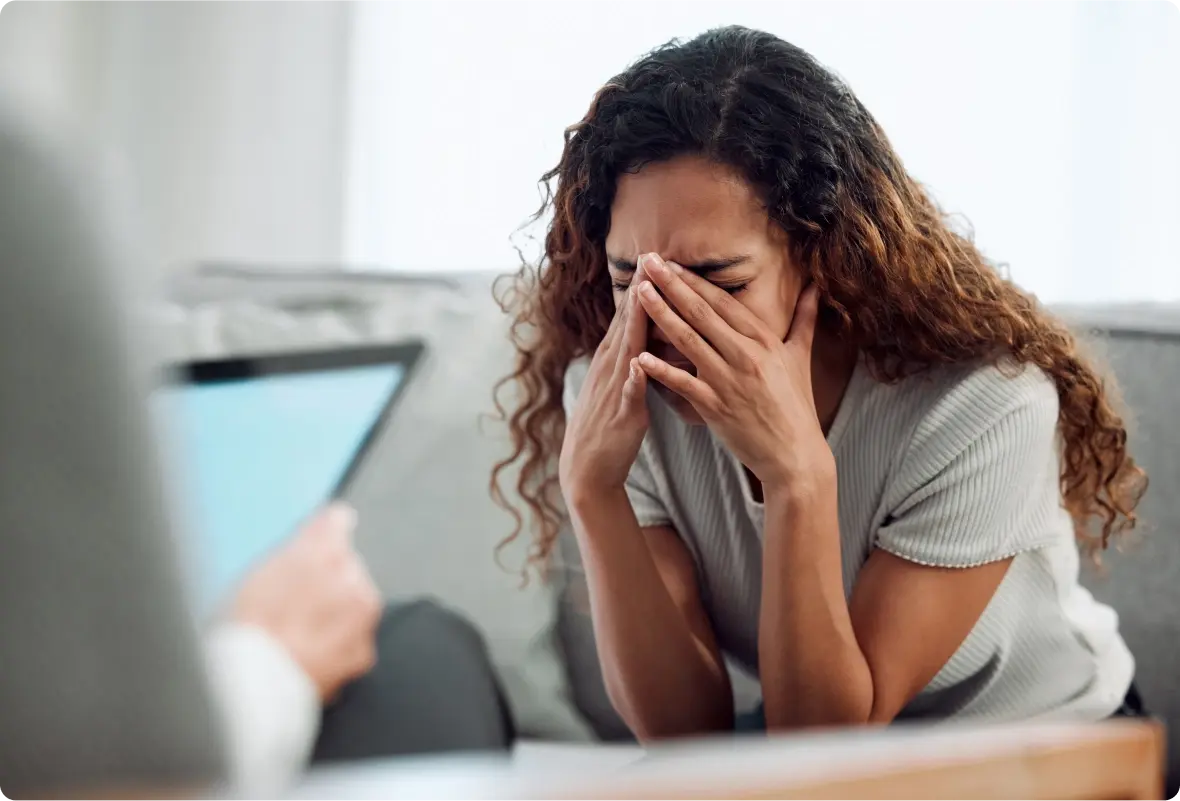Yes – hormone replacement therapy (HRT) can help reduce anxiety in some women by stabilizing hormone levels during perimenopause and menopause, though results vary by individual. Hormone changes often trigger mood swings, brain fog, and sleep disruption that can worsen anxiety.
At SensIQ, Dr. Luke Barr and his clinical team focus on evidence-based solutions, guiding women toward safe treatment options while separating science from wellness hype.
Key Takeaways
- Hormone replacement therapy (HRT) may reduce anxiety during menopause by stabilizing oestrogen levels, but results vary depending on age, hormone levels, and health profile.
- Improvements can begin within 2–6 weeks, with more consistent benefits for anxiety, mood swings, and quality of life often seen by three to six months.
- HRT can also affect related symptoms such as brain fog, night sweats, and low mood, though not all women experience the same outcomes.
- Non-hormonal strategies like exercise, nutrition, sleep hygiene, CBT, and botanicals such as Ashwagandha offer additional options for managing anxiety.
- Medical evaluation is essential because HRT carries potential side effects and may not be appropriate for women with certain health conditions.
How Hormone Replacement Affects Anxiety
Hormonal changes that trigger anxiety
Hormone replacement therapy (HRT) works by addressing the hormonal shifts that occur during the menstrual cycle and menopause.
When oestrogen levels drop, many women notice symptoms of anxiety, mood swings, and physical symptoms such as night sweats or palpitations. These hormone levels influence neurotransmitters like serotonin and GABA, which play a role in mood stability¹.
Estradiol and anxiety in HRT
Estradiol, the primary form of oestrogen, has been studied for its effects on anxiety and depression in menopausal women. Clinical evidence suggests that restoring estradiol may reduce certain symptoms of anxiety and improve quality of life². However, responses vary, and HRT is only one treatment option among several.
Physicians emphasize weighing the potential benefits of HRT against risks and side effects before starting therapy.
Can HRT Help with Depression, Panic, and Low Mood?

Can HRT help depression?
Research indicates that hormone replacement therapy HRT may provide benefits for some women with depression and anxiety linked to menopause³. When hormone levels stabilize, symptoms of menopause, such as mood swings and sleep disruption, can lessen, creating indirect improvement in mood. Still, depression is multifactorial, and HRT is not a universal solution.
Anxiety, panic attacks, and mood shifts
Some women experience panic attacks or heightened anxiety during perimenopause. These episodes may be connected to rapid changes in oestrogen levels that affect the nervous system. Evidence suggests HRT for menopause anxiety may help reduce the frequency of panic or mood instability, though individual responses differ⁴.
Can HRT cause depression and anxiety?
Not all effects of HRT are positive. For some women, especially in early treatment, HRT anxiety may feel worse before it improves. Adjusting to new hormone levels can temporarily increase symptoms of anxiety and depression.
Monitoring by a physician like Dr. Luke Barr is essential to determine whether these effects of HRT are short-term adjustments or signals that another treatment option is needed.
Does HRT Work for Anxiety in Menopause and Beyond?
Perimenopause vs post-menopause
During perimenopause, hormone fluctuations are irregular, often causing unpredictable symptoms of anxiety. In post-menopause, oestrogen levels remain consistently low. Studies suggest that HRT may offer stronger benefits in perimenopause than after menopause, though some post-menopausal women still report improved quality of life⁵.
Typical timelines for results
For those wondering, does HRT help with anxiety quickly? The answer varies. Some women notice improvements within a few weeks, while others need several months for stable results. Factors such as age, baseline hormone levels, and co-existing health conditions influence response. Regular follow-ups ensure expectations match progress.
In practice, many physicians outline expected timelines to help patients set realistic goals.
- 2–6 weeks: Some women may notice reduced night sweats, improved sleep, and early relief from symptoms of anxiety.
- Around 3 months: Mood swings and emotional changes may begin to stabilize as hormone levels adjust.
- 6 months and beyond: Broader benefits of HRT, including improved quality of life, may become more noticeable once consistency is achieved.
These ranges are averages, and responses vary. Women should track changes regularly with their clinician to measure the effects of HRT safely.
When HRT anxiety feels worse
It is possible to feel more anxious in the early weeks of HRT as the body adjusts. This temporary response does not mean treatment has failed. Tracking symptoms of anxiety, sleep changes, and physical symptoms like night sweats helps physicians evaluate whether HRT is working or if adjustments are needed.
Best HRT Options for Anxiety and Brain Fog

Choosing the best HRT for anxiety
The best HRT for anxiety depends on each woman’s health profile. Types of HRT include tablets, patches, gels, and vaginal preparations.
Systemic forms are often considered when symptoms of anxiety, mood swings, and physical discomfort like night sweats are widespread. Vaginal dryness may respond better to localized therapies. Discussing these types of HRT with a healthcare professional ensures a safe and individualized plan.
Does HRT help with brain fog?
Brain fog is a common symptom of menopause, linked to hormone fluctuations and poor sleep. Some studies suggest HRT may improve concentration and reduce brain fog by stabilizing oestrogen levels⁶.
Others show mixed results. While not a guaranteed outcome, women who experience brain fog alongside anxiety may find cognitive improvements part of the overall benefits of HRT.
Alternatives and Risks to Consider
Non-hormonal treatments and lifestyle support
Not all women are candidates for HRT. Alternatives include non-hormonal medications, cognitive behavioral therapy, and lifestyle changes such as exercise, balanced nutrition, and stress-management strategies. These can reduce symptoms of anxiety and improve overall quality of life, either alone or combined with HRT.
Alongside HRT, lifestyle strategies play a key role in reducing symptoms of anxiety and improving daily well-being.
- Exercise: Regular aerobic activity supports both hormone balance and mood regulation.
- Nutrition: Balanced meals with lean protein, whole grains, and omega-3 fatty acids promote stable energy and fewer mood swings.
- Sleep hygiene: Creating consistent sleep routines helps reduce brain fog and restore focus.
- Stress management: Mindfulness, yoga, and evidence-backed botanicals such as Ashwagandha have been studied for their potential to lower stress levels and improve resilience⁸.
Clinical data on Ashwagandha, for example, suggests that it may help reduce stress-related cortisol levels, which indirectly supports calmer mood and better anxiety management. While not a replacement for HRT, these strategies can complement medical care when guided by a physician.
Who may not be a candidate
Women with certain medical histories, such as breast cancer, blood clots, or cardiovascular disease, may be advised against systemic HRT. In these cases, physicians may suggest non-hormonal treatment options or localized forms of therapy. Individual risk assessment is key to safe care.
Potential side effects
Like any treatment option, HRT has side effects. These may include bloating, breast tenderness, headaches, or mood swings in the early stages. Serious but rare risks include blood clots and certain cancers⁷. Open discussion with a medical provider helps balance the benefits of HRT against its potential risks.
Talking to Your Doctor About HRT for Anxiety
A conversation with a doctor is essential before starting or adjusting HRT. Physicians review symptoms of menopause, hormone levels, medical history, and lifestyle to decide if HRT is an appropriate treatment option.
SensIQ emphasizes evidence-based protocols, helping women understand both the benefits of HRT and its potential side effects, so they can make informed choices.
Final Thoughts — Does HRT Help with Anxiety?
For many women, hormone replacement therapy can reduce symptoms of anxiety, depression, brain fog, and physical symptoms like night sweats. However, HRT is not a one-size-fits-all solution.
Under the guidance of specialists like Dr. Luke Barr, menopausal women can explore whether HRT or alternatives are right for them. The goal is not just to manage symptoms of anxiety but to support long-term health, restore calm, and improve quality of life.
FAQ: Quick Answers About HRT and Anxiety
How long before HRT eases anxiety?
Most women notice improvements within 6–12 weeks, though benefits may continue to build over several months.
Can HRT make anxiety worse at first?
Yes, some women experience increased anxiety in the early weeks. This usually resolves as hormone levels stabilize, but it should always be monitored by a healthcare professional.
Does HRT help with brain fog?
Evidence suggests HRT may improve concentration and memory in some women, particularly when brain fog is linked to poor sleep and hormone fluctuations.
What alternatives exist for anxiety in menopause?
Non-hormonal treatments, such as CBT, exercise, and stress-reducing strategies like Ashwagandha supplementation, have shown potential benefits when used under medical guidance.
*These statements have not been evaluated by the Food and Drug Administration. This product is not intended to diagnose, treat, cure, or prevent any disease.
Results may vary. Individual experiences differ.
References
- Soares, C. N. (2019). Depression and menopause. The Lancet Psychiatry, 6(6), 479–488. https://doi.org/10.1016/S2215-0366(19)30145-3
- Schmidt, P. J., & Rubinow, D. R. (2009). Sex hormones and mood in the perimenopause. Annals of the New York Academy of Sciences, 1179(1), 70–85. https://doi.org/10.1111/j.1749-6632.2009.04982.x
- Gordon, J. L., Rubinow, D. R., Eisenlohr-Moul, T. A., Xia, K., Schmidt, P. J., & Girdler, S. S. (2018). Estradiol for the prevention of depressive symptoms in the menopause transition: A randomized clinical trial. JAMA Psychiatry, 75(2), 149–157. https://doi.org/10.1001/jamapsychiatry.2017.3998
- Freeman, E. W. (2010). Anxiety and menopause: Emerging clinical perspectives. Menopause, 17(6), 1183–1187. https://doi.org/10.1097/gme.0b013e3181f62949
- Gleason, C. E., Dowling, N. M., Wharton, W., Manson, J. E., Miller, V. M., Atwood, C. S., Brinton, E. A., Cedars, M. I., Lobo, R. A., Merriam, G. R., Neal-Perry, G., Santoro, N. F., Taylor, H. S., Black, D. M., Budoff, M. J., Hodis, H. N., Naftolin, F., Harman, S. M., Asthana, S., & Kronenberg, F. (2015). Effects of hormone therapy on cognition and mood in recently postmenopausal women: Findings from the randomized, controlled KEEPS–Cognitive and Affective Study. American Journal of Psychiatry, 172(5), 511–522. https://doi.org/10.1176/appi.ajp.2014.14070938
- Weber, M. T., Maki, P. M., & McDermott, M. P. (2014). Cognition and mood in perimenopause: A systematic review and meta-analysis. Endocrine Reviews, 35(1), 91–134. https://doi.org/10.1210/er.2013-1070
- National Institute on Aging. (2021, May 1). Hormone therapy for menopause. U.S. Department of Health & Human Services. https://www.nia.nih.gov/health/hormone-therapy-menopause
- Chandrasekhar, K., Kapoor, J., & Anishetty, S. (2012). A prospective, randomized double-blind, placebo-controlled study of safety and efficacy of a high-concentration full-spectrum extract of Ashwagandha root in reducing stress and anxiety in adults. Indian Journal of Psychological Medicine, 34(3), 255–262. https://doi.org/10.4103/0253-7176.106022

